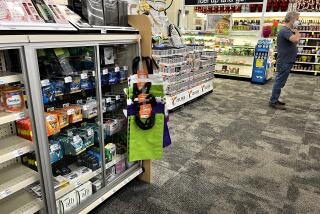Childhood obesity is ‘very serious’ problem in California, poll finds
- Share via
A growing number of Californians consider obesity to be a “very serious” problem facing children in the state and believe unhealthy fare in schools should be restricted, according to a statewide poll released Tuesday.
“They recognize the seriousness of the childhood obesity epidemic and understand that changing public policies is the key to creating healthier communities,” said Dr. Robert K. Ross, president and chief executive of the California Endowment the Los Angeles-based nonprofit that funded the Field Poll survey.
DOCUMENTS: Read the complete poll
Nearly 60% of those polled, up from 46% eight years ago, called childhood obesity a “very serious” problem, according to the survey of 1,005 registered voters. In addition, one in three cited unhealthy eating habits more than any other factor — including illegal drug use and violence — as the “greatest health risk” for children in California. More than half said they would support a tax on soda and soft drinks to fund the fight against childhood obesity, and 61% said all drinks with added sugars should be banned from schools.
“It is a two-pronged assault: We need to take a lot better care of our kids in terms of what we’re feeding them, between drinks and portion size, and we need to give them more access to physical activity,” said Timothy Tobin, program coordinator and head coach at Safe Harbor Aquatics Club, which last year started providing free water polo and nutrition classes to about 50 students and their families in the San Gabriel Valley.
Of those polled, 81% of African Americans and 68% of Latinos said childhood obesity was a “very serious” problem, compared with 54% of whites. Of those earning less than $20,000, 65% said childhood obesity was very serious, compared with 55% of those earning $100,000 or more.
Three-quarters of those asked said businesses and governments should promote healthier behavior. Nearly 90% of that group favored requiring physical education classes for four years in high school; keeping school gyms, tracks, playgrounds and fields open when school is out; and making street improvements so it is easier to bike and walk.
Nearly two-thirds of those polled said supermarkets should be encouraged to open in low-income neighborhoods. Although 61% of those polled said it was very easy to find fresh fruit and vegetables locally, just 19% of parents in six low-income communities the endowment polled agreed.
Natalie Miano, a nutrition educator with the Network for Healthy California, has taught nutrition classes for the Safe Harbor program and advised a student group making nutritional videos at Rowland Unified School District. Miano said parents’ misconceptions remain a challenge, with many assuming fresh ingredients are more expensive or avoiding fruits and vegetables they do not recognize.
Miano said many parents live far from farmers markets or other stores known for fresh products. Instead, she takes them to local supermarkets, such as the 99 Cents Only Store, to search for ingredients, assemble weekly meal plans and cook a given dish, such as chicken sesame stir fry with snow peas.
“They are making healthy changes,” Miano said, “but it takes small steps.”
molly.hennessy-fiske@latimes.com
More to Read
Sign up for The Wild
We’ll help you find the best places to hike, bike and run, as well as the perfect silent spots for meditation and yoga.
You may occasionally receive promotional content from the Los Angeles Times.











